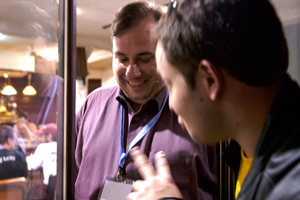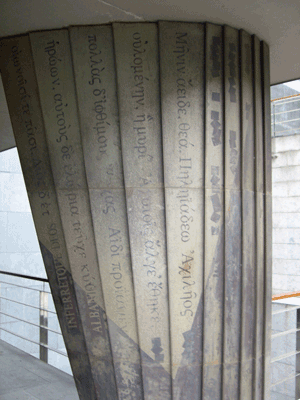I’m back from Barcelona despite Delta’s best efforts to trap me at JFK airport. No rain, no snow, no sleet, no security alert, no strike. Nothing. But somehow Delta managed to turn a scheduled 40 minute flight to Boston into a 3 hour delay to board plus another 2.5 hours sitting on the runway waiting to take off. So instead of arriving at 18:00, we didn’t arrive in Boston until 23:30.
It is interesting to look at FlightStats.com to see how they rate this particular flight. It says that DL 480 has an on-time percentage of 30%, and is excessively late 52% of the time. The average delay for this flight is 79 minutes.
I just don’t get it. It is one thing to be slow. But why can’t you be slow and still be accurate in your estimates? If you are going to be 79 minutes late on average, then why don’t you adjust your schedules accordingly?
In any case, the conference in Barcelona was great! This was my 2nd year attending OOoCon. Last year, in Lyon, I attended OOoCon as an outsider. I remember then being asked by several attendees why IBM was not contributing code to the community and thinking to myself how much it sucked that we were not doing so. What a difference a year makes! Now the discussion is not if IBM will contribute, but the logistics of exactly when and how we will make our contributions. I was proud to attend the Barcelona conference as a real OpenOffice.org member, and I can tell you that the beer tastes better when you are a member of the community.
I gave a presentation called “ODF Interoperability: The Price of Success” on Wednesday. The slides should be posted up here within a few days. A video of the presentation is here. Your best bet is to wait for the slides and follow along with my audio.
On Thursday I lead a full-day workshop on ODF interoperability on behalf of the OASIS ODF Adoption TC. We had participants from a number of ODF vendors/projects: IBM, Sun, Google, Novell, SEPT-Solutions, Haansoft, OpenOffice.org and KOffice. We worked through a few exercises where we tested the exchange of documents that reflected a number of typical real-world business cases. Although they did not attend, we also did some tests with the Clever Age Word Add-in. This event was the first of hopefully several workshops where we will attempt to bring the vendors together in a focused effort to improve ODF interoperability.
There were many good conference sessions that I wanted to attend but missed. That is the downside of having a full day workshop. Of the sessions I did see, the highlights were:
- Louis Suarez-Potts’s opening keynote “OpenOffice.org 3.0 and Beyond”
- Hu Cai Yong’s impassioned “Beyond Technology, the Chinese Roadmap” on the subtext of Western cultural imperialism embedded in some “one size fits all” commercial software application suites.
- Barbara Held’s talk “Toward openness and accessibility” (video available here)
For the ones I missed, I need to go back and watch the taped sessions and read the presentations.
Overall, it was great to see old friends, and meet so many more for the first time, including some with whom I have corresponded with at length, but never before had met in person.
I didn’t have much time to play a tourist, so I’ll give you only two pictures. The first I’ve taken from the Ars Aperta website, a picture of Charles Schulz and I exchanging funny stories at the Mac Porting party:

And in the “Maybe My Youth Was Not Misspent” Department comes this picture of a decorative “column” outside the building where I gave my presentation on Wednesday. The building hosts the University of Barcelona’s philology department. I immediately recognized the text as Homer and snapped this photo. The next day I was passing when two students were trying to read it. I stopped, and stood, with arms dramatically outstretched, and in my best Greek dactylic hexameter, recited from memory the Invocation to the Muse that begins the Iliad. So, thank you Professor Higbie, wherever you are, for making us memorize Homer. It actually came in use!
